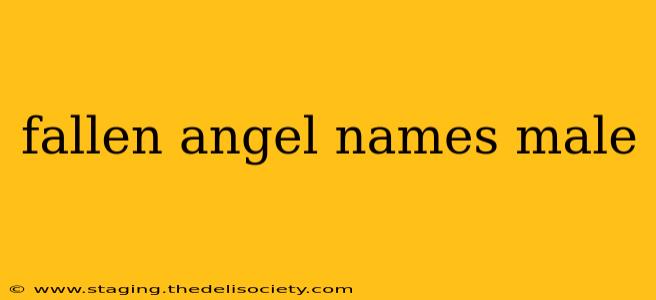Fallen angels, those celestial beings who rebelled against heaven, hold a captivating place in mythology and popular culture. Their names, often imbued with power and sorrow, reflect their fallen state and the inherent duality of their nature – a blend of the divine and the damned. This exploration delves into the rich tapestry of names associated with these fallen celestial beings, exploring their origins and the evocative imagery they evoke.
Understanding the Naming Conventions of Fallen Angels
Before delving into specific names, it's crucial to understand that many "fallen angel names" aren't directly sourced from canonical religious texts. While biblical texts mention Lucifer (the most famous fallen angel), many others are products of later literary and artistic interpretations. These names frequently draw upon:
- Biblical allusions: Many names subtly reference biblical figures or themes, suggesting a connection to the divine even in their fallen state.
- Classical mythology: Greek and Roman mythology provides a wealth of names associated with rebellion, darkness, and powerful forces, often repurposed for fallen angel characters.
- Symbolic meanings: Names are chosen for their symbolic resonance, reflecting attributes like pride, wrath, deception, or despair – traits often attributed to fallen angels.
Male Fallen Angel Names: A Comprehensive List
The following list offers a diverse range of names, categorized for easier browsing:
Names Evoking Power and Authority:
- Azazel: Often associated with the scapegoat ritual in the Book of Leviticus, Azazel represents a powerful and rebellious spirit.
- Belial: A name synonymous with wickedness and lawlessness, Belial embodies the ultimate antithesis of good.
- Lucifer (or its variants): The most well-known fallen angel, Lucifer (meaning "light-bringer" ironically), is a symbol of pride and rebellion. Variations like Lucifuge and Luciferion add to the mystique.
- Abaddon: Meaning "destruction," Abaddon is another prominent name associated with the abyss and the forces of chaos.
- Mastema: A name often linked to accusations, slander, and the instigation of evil.
Names Suggesting Deception and Trickery:
- Samyaza: Often depicted as a leader among the Watchers, a group of fallen angels who mingled with humans.
- Aram: A name that subtly hints at rebellion and treachery, a fitting moniker for a deceitful celestial being.
- Uzzael: Though less known, Uzzael's ambiguity adds to his enigmatic and potentially deceptive nature.
Names Reflecting Sorrow and Despair:
- Eblis: A name primarily used in Islamic traditions, Eblis signifies a fallen angel cast out for his pride.
- Naamah: While often associated with a female fallen angel, the name's inherent beauty contrasts starkly with the darkness associated with fallen angels, creating a compelling dissonance. Consider it for a character whose fall is marked by profound loss and regret.
Creating Your Own Fallen Angel Name
Beyond this list, you can create compelling names by combining elements from different sources. For instance, you might use a Greek prefix (like "Apo-" meaning away from) combined with a word suggesting darkness or power (like "calypse" or "gelion").
The Enduring Appeal of Fallen Angels
The enduring fascination with fallen angels stems from their inherent paradox: once beings of immense power and beauty, they chose to rebel, leading to their downfall. Their names encapsulate this tragic grandeur, providing evocative labels for characters navigating the complexities of good and evil. Whether drawing inspiration from established names or forging your own, the naming process itself becomes a creative exploration of this timeless theme.
